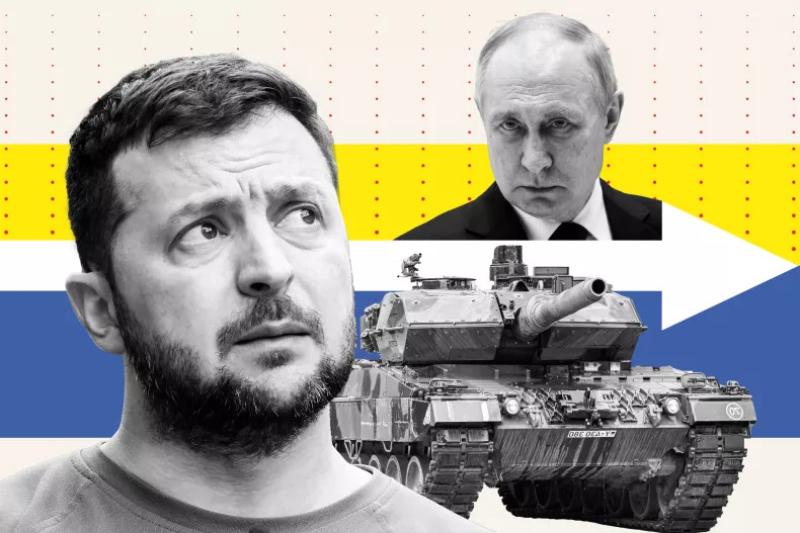Ukraine Counterattack Isn't Going According to Plan (And NATO Is to Blame)
By: Brendan Cole (Newsweek)


Recriminations, excuses, and scapegoats invoked to obscure a foreseeable outcome. Modern western military planning has devolved to public relations stunts, scoring political points, and wheedling Congress for more money. The military success in Afghanistan can be attributed to how the US military plans to fight wars. A $trillion more for victory!
The United States and NATO were struggling to resupply Ukraine during the battle of Bakhmut. And Ukraine was forced to withdraw. We're supposed to believe that an all-fronts offensive can succeed? Who came up with this plan?
Ukraine can't mount an effective counteroffensive. Ukraine doesn't have enough manpower and materiel for an all-fronts offensive. And if Ukraine mounts a concerted offensive effort somewhere along the front then Russia can blunt that offensive by attacking elsewhere. Ukraine's all-front offensive is little more than a defensive action to firm up the frontlines for the winter. A stalemate. A quagmire.

Volodomyr Zelensky may get a Tinseltown welcome in Western capitals but the Ukrainian president has said the slow progress of Kyiv's counteroffensive shows the reality of war is not a Hollywood movie.
The speed of Ukrainian gains last year north of Kyiv soon after Russia's full-scale invasion, and then in September in the oblasts of Kherson and Kharkiv, raised expectations that Kyiv's latest push could retake a similar amount of Russian-occupied territory.
Equipment from allies including HIMARS (High Mobility Artillery Rocket Systems), Challenger 2 tanks and Bradley infantry fighting vehicles added to the anticipation of what might happen when the counteroffensive finally started around June 4.
However, unlike last year's advances, which saw Ukraine claim to have liberated 4,600 square miles between September 6 and October 2, the offensive beginning more than seven weeks ago has seen approximately 80 square miles and eight settlements recaptured, according to Kyiv.
While there are numerous reasons for this relative lack of success, including the strength of Russian defenses, some experts are pointing towards a less obvious influence: NATO. The alliance pushed an arbitrary deadline for the counterattack, they say, and then failed to fully prepare Ukrainian forces to carry it out.
Ukraine Faces a Well-Prepared Foe
"It's fair to say that for Ukraine It's not going as smoothly as they would like," Glen Grant, a military analyst who has advised Ukraine's armed forces, told Newsweek.
"But this is a learning process, remembering how few of them have ever been involved in attacking and when you're attacking, there's no hiding place in a trench," said Grant, a senior expert with the Baltic Security Foundation, a security and defense think tank in Latvia.
Moscow occupies 17 percent of Ukrainian territory, a fact Harvard Professor Graham Allison referred to in TheWashington Post where he wrote the current rate of progress means Kyiv would need another 16 years to recapture all its territory.
Ukraine's previous offensives were successful last year when faced with Russian forces who were thinly spread out and struggling with logistical and command difficulties. Now Ukraine is advancing against well-prepared Russian defenses.
Kyiv's new Western-supplied weaponry has been met by valleys of trenches dug by Russians along the 600-mile front line. These include minefields, anti-tank ditches and "dragon's teeth"—square-pyramidal shaped pieces of concrete used to stop military vehicles.
On June 8, Ukrainian forces got caught in a minefield during an assault close to Mala Tomachka on the Zaporizhzhia front and pro-Russian bloggers crowed over images of destroyed vehicles, including Leopard tanks and Bradley IFVs.
In the first two weeks of Ukraine's counteroffensive, up to one fifth of the equipment it sent to the battlefield was damaged or destroyed, The New York Times reported, citing U.S. and European officials.
This has dropped after Ukraine focused more on wearing down Russian forces with artillery and long-range missiles than charging into enemy, The Times said.
But the counteroffensive has slowed with Ukrainian troops advancing only five of the 60 miles they need to reach the sea in the south and split Russian forces into two. So Ukrainian gains have been incremental rather than spectacular.
"Ukraine's recent advances are remarkable given Russia's massive defensive measures," Jay Truesdale, a former U.S. diplomat and CEO of Veracity Worldwide, a geopolitical risk consultancy, told Newsweek.
"Ukraine must still compensate for its lack of air superiority and ammunition, which are both essential components of a successful offensive, especially given the higher Russian rate of fire."
The 1991 Gulf War started with a 42-day air campaign before ground operations started, while the 2003 invasion of Iraq involved more than 1,800 combat and support aircraft. Ukraine has no such air advantage.
However, Truesdale still believes that Kyiv's allies are "optimistic" that Ukraine can make gains, although it does face a pressing timeline to demonstrate success, limits imposed by the coming winter and the political cycles of its Western backers.
'Not Meeting Expectations'
An American official told CNN on June 23 that the offensive was "not meeting expectations" on any of the three fronts. Zelensky himself admitted the push had been "slower than desired."
But the world is watching as concerns grow that Ukrainian is making military decisions due to a Western timetable, with results expected ahead of this month's NATO summit in Vilnius. "The timing of the summer action was driven by arbitrary NATO timelines, not Ukrainian," military analyst Allan Orr told Newsweek.
Orr said that pushing Ukraine's forces to transition from guerrilla defense to conventional offense within six months "was always too much to ask." Also, it's his view that NATO neither resourced Ukraine adequately, nor gave Kyiv enough time to master the equipment it provided Kyiv with.
A lack of fourth-generation jets, limited HIMARS and the belated arrival of armor have contributed to its inability to penetrate well-prepared Russian defense lines, he said.
Newsweek has contacted NATO for comment.
"The whole offensive was underpinned by an assumption that the Russian line would collapse under pressure due poor morale—it didn't," said Orr. "In actuality, the Russians have adapted faster than the Ukrainians were trained."
"The counter-offensive was a case of single spectrum warfare, a rushed one-dimensional push against an un-flankable defensive line," he added, resulting in high casualties and low returns.
He said that Kyiv is trying to penetrate all along the front at once with limited resources.
"Rather it needed to marshal its limited resources to penetrate at only a few points along the line by substantially overwhelming the defenders at select points," he said. "That's how a numerically inferior army fights."
In noting that Kyiv had retaken 50 percent of Russian-occupied land, Secretary of State Antony Blinken said on Monday the counteroffensive was in its "relatively early days," signaling that the hope for quick gains has given way to an acceptance by Kyiv's allies that the push will take months not weeks.
"The Ukrainians timed the counteroffensive with one goal in mind—to present themselves at the NATO summit with tangible results," said Nicolo Fasola, research fellow at the University of Bologna in Italy, whose work focuses on Russia's military strategies.
Operational problems such as the lack of air or artillery cover may have strengthened Kyiv's calls for long-range weapons but modern equipment alone is not enough.
"I think we pushed too much on the technological side of strategy hoping that just by giving Ukraine advanced Western weaponry, that would be sufficient for them to overcome Russian forces which have lesser equipment," he told Newsweek.
"Yes, we have given Ukrainians state-of-the-art Western weapons, but we haven't had enough time to train them thoroughly and properly. Even if at tactical level, we have very skilled Ukrainian soldiers who can learn very fast to use our weapons, it's difficult to integrate new weaponries into their doctrine in a very short time."
Meanwhile, Glen Grant of the Baltic Security Foundation believes that the West missed an opportunity to maintain the initiative when Russian forces had their noses bloodied in Kharkiv and Kherson last October.
More sophisticated weapons are welcome, but Grant said more infantry equipment such as grenade launchers were required, especially in areas like Bakhmut, where fighting has largely been carried out by infantry.
"There is no right or wrong here," he said. "You have to fight with what you've got and if you haven't got everything that you actually need, then it becomes more difficult and slower."
The Institute for the Study of War said on Sunday that it is too early to evaluate Ukraine's counteroffensive since Kyiv still has significant uncommitted forces and is able to launch decisive operations when and where it wants to.
There are also battlefield differences between the latest offensive and the last year's.
"It's one thing being on the defensive when you've got a trench and you're just being asked to survive," said Grant. "When you're actually being asked to go forward into withering fire—that requires a different sort of character altogether.
"The Ukrainians will be perfectly blunt on this— some of them are finding this difficult but thank God there are lots of them doing it."
Let's not be too obnoxious.







Since the election cycle is now well underway and it's obvious Ukraine won't deliver a major victory, we can expect a major political offensive from the Biden campaign. Biden will likely push for greatly increased monetary support before the primaries since political support will wane during the election. It's quite possible that Ukraine will become another division within the Republican Party.
Of course, the impact of Biden's screwup on US presence in foreign affairs depends to a large extent on Biden's reelection. There is a slight possibility that Ukraine will force a shakeup in US military leadership. And a somewhat greater possibility that US leadership in NATO will be challenged. The Ukrainian quagmire will likely tarnish the US reputation in European affairs regardless. The wildcard will be how China attempts to take advantage of Biden's screwup. Biden won't eat crow so Biden may become more belligerent toward China during the election campaign to cover his obvious Ukrainian weak spot.
Ukraine will be receiving more attention during the 2024 election and that may actually determine how Ukraine is partitioned. Foreign adversaries will attempt to push Ukraine into the spotlight. And Biden's screwups will be obvious campaign fodder for Republican candidates. Biden may actually begin pushing for a Zelensky replacement before the election as political damage control.